- Home
- Sharon Shinn
The Safe-Keeper's Secret Page 4
The Safe-Keeper's Secret Read online
Page 4
They decided, after all, to go to the spring, half a mile away and icy cold no matter what the season. As always, Fiona loped along in a relatively straight line toward the goal, while Reed ranged around her in elliptical circles. He ran ahead of her to chase a butterfly, fell behind to study an anthill, tossed a ball in the air and then had to run after it when it did not land where he expected. Occasionally he would loop back to show her some treasure—a red rock, a broken flower, a captured spider with long, thin legs. Fiona was the only girl she knew who didn’t mind spiders—or any other bugs, for that matter—so she inspected the creature closely and then set it free. Reed had already forgotten it, running off again in pursuit of other diversions.
When they made it to the creek, Fiona hitched up her skirts while Reed rolled up the pants of his trousers, and they waded in the water. The stones under their feet were slippery with moss, and of assorted sizes, so it was hard to keep their balance; but they were good at this. They had spent a lot of time in the creek. Fiona found three flat rocks and skipped them, one by one, down the length of the water. Reed went splashing after fish, never quiet enough or quick enough to catch them.
“When I grow up, I’m going to get a boat and go out to sea off the Cormeon coast,” he announced. “And then I’ll catch all the fish I want.”
He was always changing his mind about what he wanted to be when he reached the age to choose a career.
“When I grow up, I’m going to stay right here,” Fiona said. She had waded out of the water and was now sitting on the muddy bank, shredding long pieces of grass with her fingernails.
Reed came over with great splashing steps and she drew back a little to avoid getting spattered. He stood in the cold water right in front of her, kicking at the ripples of the current. “Or I might go to Movington and work in the mines,” he said.
Fiona wrinkled her nose. “It seems like hard labor. And dirty.”
“Or I might learn to be a blacksmith. Ned said he’d take me on some day, if I could ever learn to settle down.”
Fiona laughed. “Then you’ll never be a blacksmith.”
“Or I might go to Wodenderry and meet the king,” he said.
Fiona threw her scraps of grass into the swift-moving water. “I don’t think it’s so easy to meet the king,” she said.
“I’ll go up to him and say, ‘Hello, your royal highness, did you know I’m your son?’”
“And he’ll say, ‘Here are the keys to my kingdom!’” Fiona said. “I don’t think so.”
“He might not think I’m really his son,” Reed agreed.
“You don’t have any proof.”
“And Mother and Angeline will never say for sure.”
“Maybe you’re not the king’s son,” Fiona said. “Maybe you’re the king’s brother’s son. Maybe you’re the king’s enemy’s son. Maybe you’re the son of nobody in particular, but the king’s Safe-Keeper stole you out of the royal city for reasons of his own.”
Reed stooped down to scoop a stone out of the water. “Well, it would be good to know for sure,” he said, and skipped the stone down the stream. He was better at this than she was; it dipped in and out of the water six times before it finally sank.
Fiona shrugged. “It doesn’t matter to me. I don’t need to know.”
“You’re not curious, like I am,” he said, nodding.
She shrugged again. “I don’t mind secrets.”
That wasn’t true, though. It was just that she didn’t mind this particular mystery. Other secrets made her edgy. She didn’t like it when girls at the schoolhouse whispered to each other and then looked around the room and giggled and whispered some more. She didn’t like it when people stopped at her mother’s house looking pale and despairing, and her mother sent the children away for an hour. When Fiona and Reed returned, her mother usually looked tranquil as always, but now and then she looked troubled, a little grim, as if she had eaten something that made her a bit sick. Fiona didn’t like those secrets.
She had secrets of her own, things she had told no one. She had found a gold coin on the road one day, apparently dropped from a noble’s coach, and she had hidden this in a little box at the bottom of her dresser. She had flirted with Calbert Seston one day out behind the schoolhouse, but he had not seemed to be aware that she was flirting and he never paid any more attention to her than he had before. She had heard Thomas say to her mother one night, “There’s one truth you ought to know, and that’s that I love you.” And though she wished it wasn’t true, her mother had replied, “I love you,” right back to him. Fiona hadn’t told anyone of that overheard conversation, not even Angeline, not even Reed.
Despite her ability to keep her own counsel, Fiona found that not many people confided in her. The girls at school did not draw her aside to whisper about the boys they liked or the little transgressions they had committed. Strangers did not stop her on the street so they could pour their hearts out to her. She had mentioned this to her mother, and Damiana had tried hard not to burst out laughing.
“Oh, sweetie,” Damiana had said, hugging her tightly, “it doesn’t work that way. You’re not a Safe-Keeper when you’re ten years old. You might be eighteen, you might be twenty—one day it will happen and you will just feel it. Like the silence that comes after all the crickets and the cicadas have stopped singing. You will feel it, and everyone else will sense it. But it won’t happen for a while yet, if it ever does. Listen to all the music of the world for a while yet, while you can still sing it back.”
It was only Reed, really, who told her any secrets at all, and they were small ones so far. He’d accidentally broken the weather vane at Dirk’s father’s tavern; on purpose, he and Greg had thrown eggs at Ned’s blacksmithing barn. Fiona rather disapproved of the egg-throwing incident, but she realized a Safe-Keeper could not be a judge, so she did not reprimand him. She merely said, “I’ll never be the one to tell.” It was Greg who confessed to his mother, which got both the boys in trouble, and they had to spend the whole next weekend cleaning out Ned’s tool shed. Fiona supposed that was more a punishment for wrongdoing than for choosing the wrong confidante, and she didn’t consider it her fault that the whole tale came to light. Nonetheless, it showed her the consequences of a secret betrayed, and so she vowed to guard her own private information—when she had it—with a fierce and unbreakable reserve. She thought even Thomas could not ask her to do better than that.
Chapter Three
Both Thomas and Angeline stayed two more days, then headed back to Lowford with Robert and Victoria. Three days later, the Dream-Maker came to the door.
She arrived at the house in a ramshackle traveling coach pulled by sorry, mismatched horses, and she climbed out with all the painstaking slowness of an old woman burdened by too much weight and too many aches. She was trying to pay the driver—who steadfastly refused to take her money—when Fiona and Reed came running up to throw themselves at her.
“Isadora!” they cried, frisking around her until she opened her arms and took them each into a hug.
“Look at you, Fiona, so pretty. Reed, how did you get so tall? I swear, you are two of the most beautiful children I’ve ever seen. Give me a hug, now, and then let me go. Reed, can you carry my bags? Goodness, you’ll be a man before I know it.”
Damiana came out of the house with her widest smile on her face. Fiona knew that, of all her friends, Damiana loved Isadora the best. But then, so many people did.
“Isadora! I didn’t know we were expecting you,” Damiana said, leaning forward to kiss the older woman on the cheek.
“I wanted to come for the children’s birthday, but I was held up in Thrush Hollow,” Isadora said in a mournful voice.
Damiana instantly looked concerned. “Oh no. What’s wrong?”
Isadora shook her head. “The baby—born too soon—well, that’s another one gone. I stayed with my daughter two weeks, but after a while it was clear she wanted the house to herself. So I came here.”
Dami
ana took Isadora’s arm and drew her toward the door. “Fiona, can you go pick some fresh mint?” she asked over her shoulder. “I’ll make some tea and we’ll talk.”
As Fiona moved through the herb garden, she reflected on Isadora’s sad life. It was said that every Dream-Maker experienced excessive personal tragedy, but Fiona found it hard to believe that any of the other women could have gone through quite the series of calamities that Isadora had experienced before the role of Dream-Maker fell to her. She had been married quite young and had two children; her husband had died of fever. A second husband, by whom she had another child, had been hanged for murder. Fiona wasn’t sure what had happened to the third husband, though he appeared to be gone for good after leaving her with three more children. Her two oldest boys had perished at sea; her youngest daughter had run away when she was fourteen and had never been seen again. This middle daughter, with whom Isadora was closest, had given birth to three stillborn children. Parents, siblings, cousins—all had either turned away from Isadora in anger or been lost to disaster.
But that was the life of a Dream-Maker, Fiona knew. Unlike Truth-Tellers and Safe-Keepers, who could be found throughout the kingdom, only one Dream-Maker lived at any given time. She was almost always an older woman whose own life had been full of woe, but everywhere she went, somebody’s dearest wish came true. Thus she was beloved from one end of the kingdom to the other. Innkeepers gave her their grandest rooms; poor farmers and rich merchants pressed food and coins into her hands. Young girls showered her with kisses, hoping her mere presence could make some favored young man turn to them and fall in love.
Fiona had asked Isadora once why she decided to grant some wishes and not others. Isadora had shaken her head, and her untidy mass of gray curls had tumbled free from its pins. “I’d like to be able to tell you that,” she said a little sadly. “There are so many wishes I would have granted if I could! But the power doesn’t seem to work that way. It is my presence, not my will, that knocks some hidden desire into being. I have no control over the process at all.”
Once that was explained, Fiona hadn’t bothered to voice her own most secret wish. She just hugged it to herself and wondered if the day might arrive when the Dream-Maker’s presence might make her own dream come true.
Reed was out somewhere playing—of course—but Fiona sat at the table like an adult, sipping fresh mint tea and listening to the two women talk. For a while, in hushed tones, they discussed Isadora’s daughter.
“I do wonder, sometimes, if she’d be better off if I never went back to visit her,” Isadora said at last. “It seems tragedy strikes her most deeply every time I’m there.”
“That can’t be true,” Damiana said quietly. “Perhaps she is being groomed to take on your role after you’re gone. Her sorrows are her own, and not of your doing.”
Isadora sighed heavily. Everything about her was heavy, from her shape to her spirits to her voice; and yet her broad, sad face was the kindest one Fiona had ever seen. “I would not wish the role on anyone that I loved or hated,” she said. “But I must confess, I am growing weary. In a few years, I will be happy enough to lay this burden down.”
“Then who will be Dream-Maker after you?” Fiona asked.
The women looked over at her, both of them smiling. “I don’t know,” Isadora said. “But someone will step forward—someone whose life has been a study in loss. One day she will realize that, even though she still cries, someone around her is rejoicing. That though she suffers, she has the power to bring joy. Almost, it will make up to her for her own troubles.”
“What dreams have you had a hand in bringing to life these past few months?” Fiona’s mother asked.
“That boy in Movington—the blind one—woke up the day after I’d been there, and he could see.”
“That’s marvelous!” Damiana exclaimed.
“His father sent me the most beautiful shawl. I would have returned it—because, really, it was not of my doing—but I’ve learned by now that joy must find an expression. No one will take their gifts back. So I put it away to give to a granddaughter some day.”
“What other dreams?” Fiona asked.
“Oh, a whole range of them. A merchant in Cranfield made an excellent investment with a high return. A woman in Lowford bore living twins after five stillbirths. A young man in Thrush Hollow was successful in his courtship—though I truly don’t think I had a hand in that, because he was a very handsome boy,” Isadora added. “I’d have accepted him myself if he’d come wooing me!”
They all laughed. “Haven’t you been in the royal city for a little while?” Damiana asked.
Isadora nodded. “It’s an odd place, though. So full of people, so rife with dreams and desires. I can feel them pressing at me when I walk down the streets. Some people will run after me and catch at my clothes and pour out their hopes and wishes. Other people will come to my rooms at all hours, night or day, desperate for favors. It is a very exhausting place to be.”
“I wouldn’t like such a place,” said Fiona.
“No, and I didn’t stay long,” Isadora agreed. “But I felt a compulsion of sorts to go there. I don’t know if there was a particular person who needed me. I don’t know if I did that person any good.”
“Did you see King Marcus?” Fiona asked.
Isadora nodded. “And his daughter. From a distance, of course. They were riding through the streets in a very formal procession, and there were guards all around them, so I didn’t get a very good look.”
“What was he like?” Damiana asked curiously.
Isadora wrinkled her nose. “I thought he appeared quite disagreeable,” she said frankly. “He sat very straight on his horse and looked out over the crowd as if he was trying to smile but he didn’t have much experience with smiles, so he wasn’t sure how to do it. Now and then he’d lift his hand and wave, but you could tell he didn’t really want to. People cheered him, of course, but I do have to wonder if they really love him.”
“He’s a good king,” Damiana observed. “The roads are well mended, the taxes are fair, and there hasn’t been war since his father was on the throne. Maybe we don’t need someone warm as long as we have someone competent.”
“Maybe,” Isadora said rather doubtfully.
“Did he look like Reed?” Fiona asked.
Isadora laughed. “Not at all. He and his daughter are both dark, though she at least has a fair complexion. His is swarthy as a farmer’s.”
“Princess Lirabel,” Damiana said. “What’s she like? Isn’t she all grown up now? Eighteen, at least?”
“Twenty,” Isadora replied. “She had a more pleasant face than her father, but she looked sad. I don’t know why I say that, because she was smiling and waving with much more energy than he was. But I just thought she looked unhappy.”
“Perhaps her father has arranged an unwelcome marriage for her,” Damiana guessed.
“I didn’t hear any talk like that while I was in Wodenderry,” Isadora said. “The rumor going around was that she wanted her father to acknowledge her as his heir next year, on her twenty-first birthday. But he will not do so—at least, this is what people were saying. I wasn’t at court, you understand, and no one was confiding in me.”
“Why won’t he acknowledge her?” Fiona asked.
The older women exchanged glances. “They say he doesn’t want a woman on the throne,” Isadora said. “You know, he married again last year, practically the minute Lirabel’s mother was dead. His new queen is quite a young woman, but so far she hasn’t borne him any children. Daughters or sons.”
“I’ll bet there’s someone who would have been wishing hard for your services if she’d known you were in town,” commented Damiana. “The new queen.”
“Perhaps I should go back soon,” the Dream-Maker said with a trace of humor, “and introduce myself at the royal palace. I could live quite a life of luxury while I tried to do a favor for my king.”
“Maybe that’s why you felt compelled
to go there after all,” Damiana said. “Maybe in a few months we’ll hear good news from the palace.”
Isadora gave an unladylike snort. “The man’s been through two wives and who knows how many companions,” she said. “And he’s only fathered the one child who lived to adulthood. That girl that he won’t allow to succeed him to the crown.”
“And Reed,” Fiona piped up.
Again, the women exchanged startled glances. “There’s no proof that Reed is the king’s son,” Damiana said gently.
“You don’t need proof,” Fiona said. “You know.”
“What I know might not be good enough for the king,” her mother responded. “Anyway, I’m sure the king would insist upon a legitimate heir. And so far Princess Lirabel is the only one he’s got.”
Just then, Reed burst through the door, covered in mud and holding a coiling snake between his hands. “Look what I found in the garden!” he exclaimed. “Do we have a box where I can keep him?”
Isadora emitted a little shriek and fell back in her chair, fanning herself with her hand. Fiona hopped up to get a closer look at the sleek, sinuous body. Damiana smiled faintly.
“Well, let me just look for a box, and then I’ll get dinner on the table,” she said. “Isadora, it looks like Reed’s dearest wish has come true. Now you won’t have to wonder why you came to Tambleham after all.”
After dinner, Reed and Fiona did the dishes, though Fiona felt that she was doing more than her share. Reed kept dropping his drying cloth so he could go inspect his new pet and see if it had eaten its own dinner of crickets and ladybugs. Damiana moved between them, humming a little, preparing gallons of tea, loaves of fresh bread, and platters of cookies, as if she expected company.

 Jenna Starborn
Jenna Starborn Troubled Waters
Troubled Waters The Thirteenth House
The Thirteenth House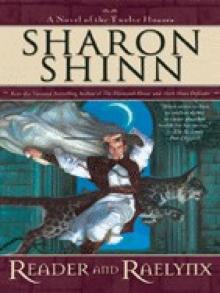 Reader and Raelynx
Reader and Raelynx Angel-Seeker
Angel-Seeker Archangel
Archangel Jeweled Fire
Jeweled Fire Nocturne
Nocturne The Shape-Changer's Wife
The Shape-Changer's Wife Still Life With Shape-Shifter
Still Life With Shape-Shifter Quatrain
Quatrain Fortune and Fate
Fortune and Fate Angelica
Angelica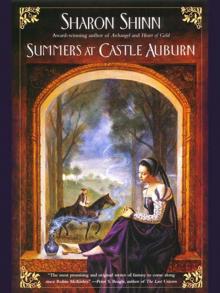 Summers at Castle Auburn
Summers at Castle Auburn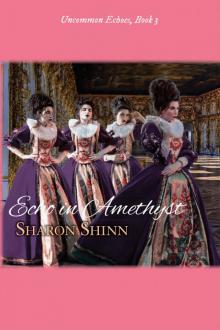 Echo in Amethyst
Echo in Amethyst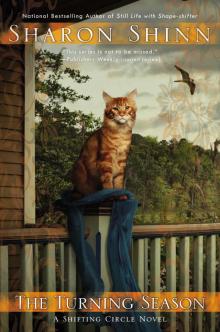 The Turning Season
The Turning Season Mystic and Rider
Mystic and Rider Heart of Gold
Heart of Gold The Shape of Desire
The Shape of Desire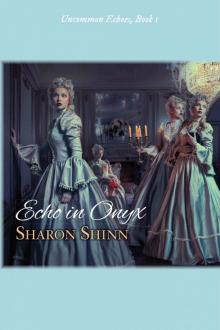 Echo in Onyx
Echo in Onyx Royal Airs
Royal Airs Gateway
Gateway The Safe-Keeper's Secret
The Safe-Keeper's Secret Wrapt in Crystal
Wrapt in Crystal Unquiet Land
Unquiet Land Jovah's Angel
Jovah's Angel Dark Moon Defender (Twelve Houses)
Dark Moon Defender (Twelve Houses) Mystic and Rider (Twelve Houses)
Mystic and Rider (Twelve Houses) Fortune and Fate (Twelve Houses)
Fortune and Fate (Twelve Houses)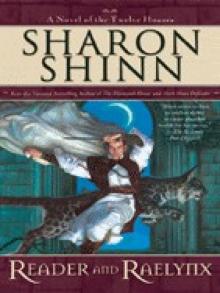 Reader and Raelynx (Twelve Houses)
Reader and Raelynx (Twelve Houses)